var is not a new feature of es6; you can use the var keyword to declare a variable. The declared variable is both a global variable and a top-level variable. It can be initialized or not assigned a value. The initialized assignment can be of any type. , if no value is assigned, it is the default value.

The operating environment of this tutorial: Windows 10 system, ECMAScript version 6.0, Dell G3 computer.
var is not a new feature of es6
Use the var keyword to declare a variable, which can be initialized or not assigned. The initialized assignment can be of any type. If not assigned, it is The default value is undefined. The var declaration is generally in the global scope and is added as a property of the window (except those declared in the function, which are function scope).
var
Variables declared with var are both global variables and top-level variables (in the browser environment, the top-level object refers to the window object, in node refers to the global object)
Variables that use var life may be subject to variable promotion
Using var can perform multiple operations on a variable declaration, the variable declared later will overwrite the previous variable declaration
When var is used to declare a variable in a function, the variable is local; if var is not used in the function, the variable is changed It is global
Compared with let, let is a new feature of es6
let
is a new command in es6, used to declare variables.
is similar to var in usage, but the declared variable is only valid within the code block where the let command is located, not There is variable promotion; as long as there is a let command in the block-level scope, this area will no longer be affected by the outside.
Before using let to declare a variable, the variable is not available, which is what everyone often says Temporary dead zone (let does not allow repeated declarations in the same scope, so we cannot re-declare parameters inside the function)
var declares variables
<script> /* *1.使用var 声明变量,可以保存任意数据类型的值, * Undefined、Null、Number、String、Symbol、Boolean、Object 7种类型 *2.在同一代码块位置: * var userName; userName="marshal" * var userName="marshal" 是完全等价有效的 * var 可以以逗号分隔,定义多个变量,分号结束 * var userName,userAge,userAddress; */ var userName="marshal";//var userName;userName="marshal"; console.log(userName); </script>
Use developer tools to view the following picture:

var scope description
Scope: at runtime , the visibility of access to variables, objects, functions and other resources in a code area. JavaScript is divided into two types, global and local. It is at the same level as the Script tag and can be understood as global. In the browser, these are called windows objects, so global variables and functions defined using var are all properties and methods of the window object. Local is defined within {} curly braces, such as inside a function, and defined in the local scope. Generally speaking, it cannot be accessed outside the function, but it can be solved through closure (more on this later).
<script>
/*
* 1.定义函数localVariable
* 2.在函数内部使用var 声明变量userName,并设置值为marshal
*
*/
function localVariable(){
var userName="marshal";
console.log("函数内部访问"+userName);//输出函数内部访问marshal
}
localVariable();
console.log("函数外部访问"+userName); //报错:UncaughtReferenceError: userName is not defined
</script>After the function localVariable() is called, the variables and objects declared using var inside the inner function are destroyed, so an error is reported: UncaughtReferenceError: userName is not defined
If var is omitted inside the function , it is a global variable. The sample code is as follows:
<script>
/*
* 1.定义函数localVariable
* 2.在函数内部省去var关键字
* 3.注不建议省去var 关键字,局部的全局变量很难维护,容易埋坑
*/
function localVariable(){
userName="marshal";
console.log("函数内部访问"+userName);
}
localVariable();//函数调用后,userName变为全局变量,可使用window对象访问。
console.log("函数外部访问"+window.userName);
</script>
[Related recommendations: javascript video tutorial, web front-end]
The above is the detailed content of Is var a new feature of es6?. For more information, please follow other related articles on the PHP Chinese website!
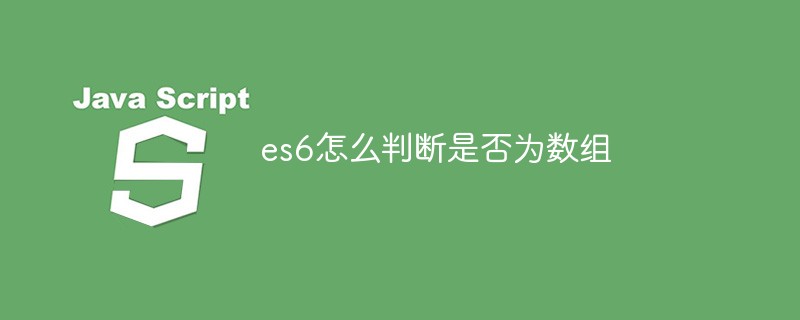 es6怎么判断是否为数组Apr 25, 2022 pm 06:43 PM
es6怎么判断是否为数组Apr 25, 2022 pm 06:43 PM在es6中,可以利用“Array.isArray()”方法判断对象是否为数组,若判断的对象是数组,返回的结果是true,若判断对象不是数组,返回的结果是false,语法为“Array.isArray(需要检测的js对象)”。
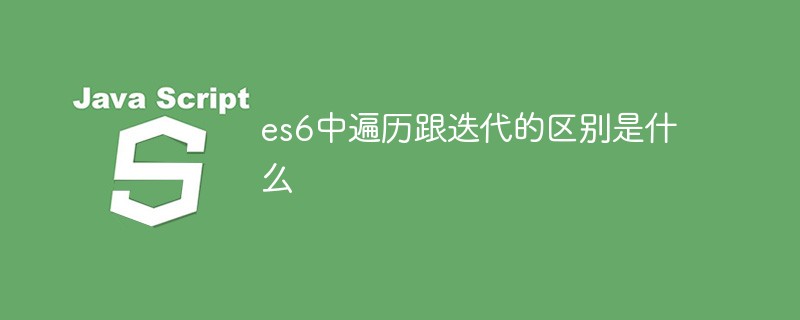 es6中遍历跟迭代的区别是什么Apr 26, 2022 pm 02:57 PM
es6中遍历跟迭代的区别是什么Apr 26, 2022 pm 02:57 PMes6中遍历跟迭代的区别是:遍历强调的是要把整个数据依次全部取出来,是访问数据结构的所有元素;而迭代虽然也是依次取出数据,但是并不保证取多少,也不保证把所有的数据取完,是遍历的一种形式。
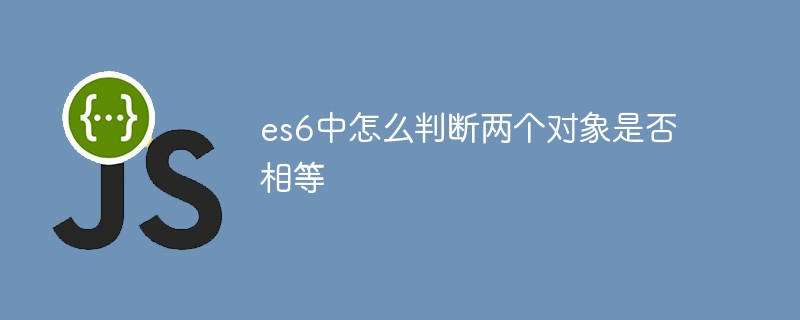 es6中怎么判断两个对象是否相等Apr 19, 2022 pm 03:34 PM
es6中怎么判断两个对象是否相等Apr 19, 2022 pm 03:34 PM在es6中,可用Object对象的is()方法来判断两个对象是否相等,该方法检测两个变量的值是否为同一个值,判断两个对象的引用地址是否一致,语法“Object.is(对象1,对象2)”;该方法会返回布尔值,若返回true则表示两个对象相等。
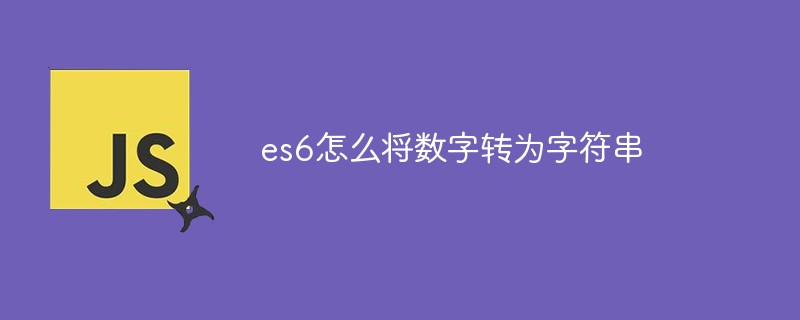 es6怎么将数字转为字符串Apr 19, 2022 pm 06:38 PM
es6怎么将数字转为字符串Apr 19, 2022 pm 06:38 PM转换方法:1、利用“+”给数字拼接一个空字符,语法“数字+""”;2、使用String(),可把对象的值转换为字符串,语法“String(数字对象)”;3、用toString(),可返回数字的字符串表示,语法“数字.toString()”。
 es6中assign的用法是什么May 05, 2022 pm 02:25 PM
es6中assign的用法是什么May 05, 2022 pm 02:25 PM在es6中,assign用于对象的合并,可以将源对象的所有可枚举属性复制到目标对象;若目标对象与源对象有同名属性,或多个源对象有同名属性,则后面的属性会覆盖前面的属性,语法为“Object.assign(...)”
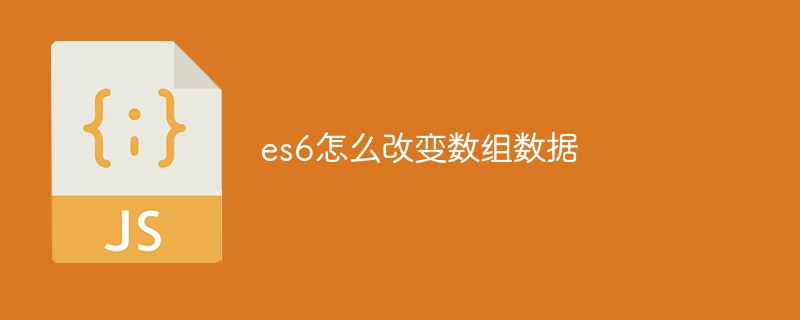 es6怎么改变数组数据Apr 26, 2022 am 10:08 AM
es6怎么改变数组数据Apr 26, 2022 am 10:08 AM改变方法:1、利用splice()方法修改,该方法可以直接修改原数组的内容,语法为“数组.splice(开始位置,修改个数,修改后的值)”;2、利用下标访问数组元素,并重新赋值来修改数组数据,语法为“数组[下标值]=修改后的值;”。
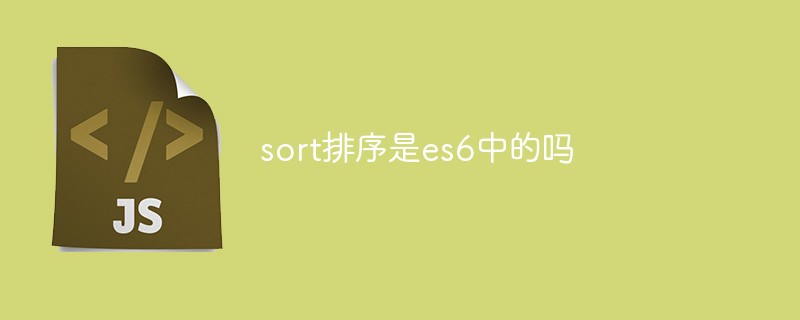 sort排序是es6中的吗Apr 25, 2022 pm 03:30 PM
sort排序是es6中的吗Apr 25, 2022 pm 03:30 PMsort排序是es6中的;sort排序是es6中用于对数组的元素进行排序的方法,该方法默认不传参,按照字符编码顺序进行排序,排序顺序可以是字母或数字,并按升序或降序,语法为“array.sort(callback(a,b))”。
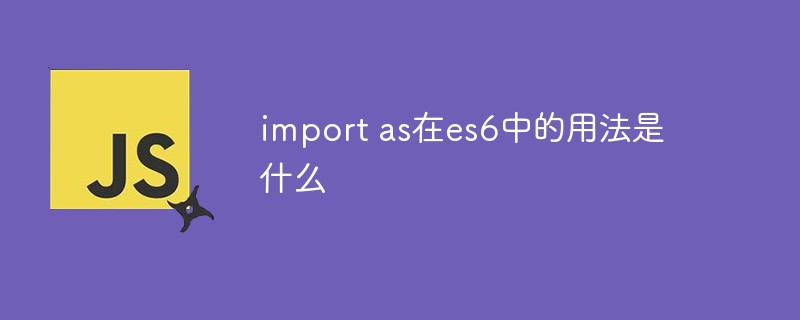 import as在es6中的用法是什么Apr 25, 2022 pm 05:19 PM
import as在es6中的用法是什么Apr 25, 2022 pm 05:19 PM在es6中,import as用于将若干export导出的内容组合成一个对象返回;ES6的模块化分为导出与导入两个模块,该方法能够将所有的导出内容包裹到指定对象中,语法为“import * as 对象 from ...”。


Hot AI Tools

Undresser.AI Undress
AI-powered app for creating realistic nude photos

AI Clothes Remover
Online AI tool for removing clothes from photos.

Undress AI Tool
Undress images for free

Clothoff.io
AI clothes remover

AI Hentai Generator
Generate AI Hentai for free.

Hot Article

Hot Tools

Dreamweaver Mac version
Visual web development tools

SublimeText3 Chinese version
Chinese version, very easy to use

SublimeText3 Mac version
God-level code editing software (SublimeText3)

SublimeText3 English version
Recommended: Win version, supports code prompts!

DVWA
Damn Vulnerable Web App (DVWA) is a PHP/MySQL web application that is very vulnerable. Its main goals are to be an aid for security professionals to test their skills and tools in a legal environment, to help web developers better understand the process of securing web applications, and to help teachers/students teach/learn in a classroom environment Web application security. The goal of DVWA is to practice some of the most common web vulnerabilities through a simple and straightforward interface, with varying degrees of difficulty. Please note that this software







